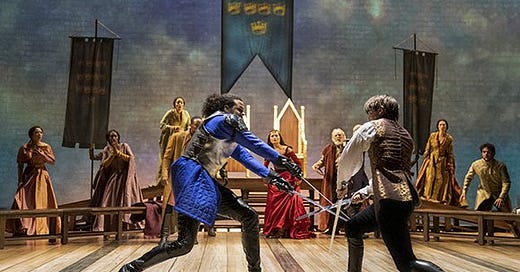To conclude my rejuvenating spring break, my family brought me and my brother to see Lerner and Loewe’s Camelot at Lincoln Center.1 To give credit where it’s due, I must acknowledge that the performers’ singing and acting were exceptional, the set and costume design mesmerizing, and the musicians flawless. Act II of this rendition left a lot to be desired in terms of cogency, consistency, and moral philosophy. However, this qualm is barely relevant; this post is predicated on Act I.
TL;DR: Arthur becomes King of England by accident at the tender age of 15 when he draws the mythical sword Excalibur from its stone. Arthur had left his cousin’s sword at his lover’s home and, racing to retrieve it for his cousin for whom he squires, succeeds in reclaiming Excalibur in a sheer act of desperation—not because he wanted to become king. In fact, King Arthur is modest, humble, and genuinely seeks to do good by his subjects. Rejecting the “might makes right” mentality of most feudal sovereigns, King Arthur establishes the Knights of the Round Table to wield “might for right.” Specifically, King Arthur dispatches his knights to establish rule of law throughout the land, subdue villains pillaging the weak, and serve as exemplars to the next generation of Englishmen. Like Adam Smith’s man of pride, King Arthur does not seek praise; he wishes to be praiseworthy, i.e., do what the impartial spectator deems good, just, and right, thereby winning the approbation of the man in the breast.
In order to bring about an era of peace between England and France, King Arthur marries princess Guinevere, making her Queen of England. Guinevere, traded against her will by her father, the King of France, to King Arthur, attempts to flee. Not realizing that the young, charming, and chivalrous man upon whom she stumbles is King Arthur—who is hiding from the ceremony himself (listen to: I Wonder What the King is Doing Tonight)—she begs him to help her escape. Instead of coercing Guinevere to marry him, Arthur offers her an escort back to France. However, after describing the wonders of Camelot, Guinevere agrees to stay and marry the young King.
Soon enters the man of vanity: Sir Lancelot du Lac. When Lancelot appears on stage for the first time, he breaks into a self-referential song documenting his own victories, virtues, and triumphs (listen to: C’est Moi):
To love and desire he ought to be unsparkable,
The ways of the flesh should offer no allure.
But where in the world
Is there in the world
A man so untouched and pure?
(C'est moi!)…
I'm blessed with an iron will.
Had I been made
The partner of Eve,
We'd be in Eden still.
C'est moi! C'est moi!
Everything Lancelot has done up to this point truly has been praiseworthy but, unlike King Arthur, Lancelot performed these deeds for praise. As predicted by Smith, Lancelot’s virtue is far less dependable than Arthur’s because the former is elicited extrinsically—it requires the attention of human spectators—while the latter is entirely intrinsic—the impartial spectator is omnipresent and omniscient. Lancelot talks a big game but, when doing the right thing becomes difficult and nobody is around to express their opprobrium, Lancelot’s “iron will” melts, “the ways of the flesh” are quite alluring, and Eden is destroyed for all. Despite pledging his life to King Arthur and the Knights of the Round Table, Lancelot sleeps with Queen Guinevere. In so doing, Lancelot breaks his vows, the law, ends the marriage between King Arthur and Queen Guinevere, and damns England and France to bloody warfare.
So much for the man of vanity. Here’s to the man of pride: King Arthur.
God save the king!
Thanks, parents!




